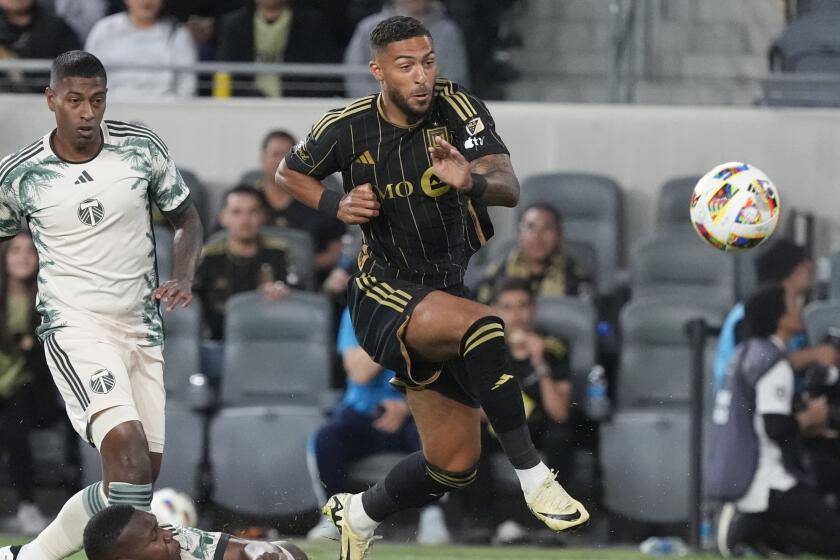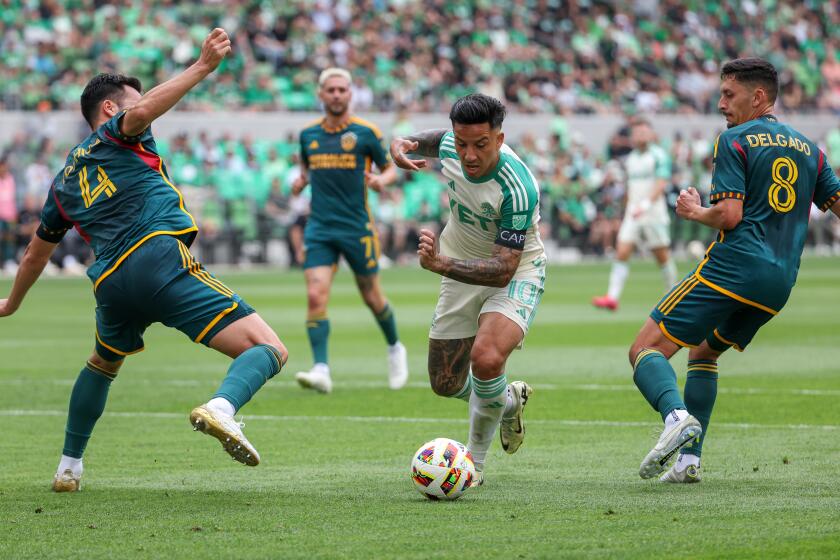The usual suspects vie for the World Cup
Soccer City, the stadium where it all begins Friday and ends July 11, sits like some alien creation on the outskirts of the city that gold built.
This is the spot — or at least one of them — where men have mined the earth for decades, bringing to the surface enough gold to make a million World Cup trophies. The mine dumps they left behind are stark testimony to their quest.
The stadium is intended to resemble a calabash, the traditional African cooking pot, but it fits poorly into the landscape. The ochre-tiled oval lacks warmth and personality.
It also lacks history, but all that will change on Friday afternoon, when Nelson Mandela and 94,000 other soccer fans wend their way to the stadium and Africa’s first World Cup becomes a vuvuzela-blowing, goal-scoring, free-kicking reality.
The opening game will be between host South Africa and Mexico, hardly a clash of powers but a potentially intriguing contest nonetheless.
Over the next 30 days and encompassing 64 games, the 31 teams that spent two years qualifying for the world championship — host South Africa qualified automatically — will gradually reduce their number to the two that will play in the final.
Only seven nations have ever won the World Cup in its 80-year history — Uruguay, Italy, Germany, Brazil, England, Argentina and France. This time around, Spain and the Netherlands are the “outsiders” most strongly favored to join this exclusive club.
But the debate about who will win in 2010 rages fiercely, with the ragged roadside flag-sellers in Soweto having as much of an opinion as well-coiffed bankers in neighboring Johannesburg.
The tournament will be played at 10 stadiums in nine cities, and the country has caught World Cup fever, although perhaps not on the same scale that Germany did four years ago. Flags flutter from car and office windows and fans vie to see who can sport the gaudiest attire.
Portugal’s star Cristiano Ronaldo appears to have won the battle of the billboards, at least in Johannesburg, but other global icons also stare down from on high. The Cup, after all, is as much a commercial venture as a sporting one.
Huge sums of money have been spent not only on venues but in infrastructure such as airports, roads and telecommunications. But the question remains: Who will win?
“To win the World Cup you need at least 20 very good players,” said Pim Verbeek, Australia’s Dutch-born coach.
If that’s the case, then Argentina, now coached by its most iconic player, Diego Maradona, is well positioned. The team features the current world player of the year, forward Lionel Messi, and the drop-off from there is not precipitous.
“Maybe the press in Argentina won’t like it, but we are going to play a very good World Cup,” Maradona said after his team had defeated three-time Cup winner Germany in Munich in March. “What we showed is that we have a team that can become world champions for the first time after 24 years.”
Considering the rivalry between England and Argentina, it might seem odd that a former England player and coach would back the South Americans, but Kevin Keegan has done just that.
“They have underperformed under Maradona so far,” he said of Argentina’s rocky qualifying campaign. “If they can get it together for six, seven matches, they have the players to win a World Cup.”
So does Brazil. The five-time World Cup winner won the Confederations Cup in South Africa last year, defeating the U.S. in the final, and also has a constellation of stars, most notably midfielder Kaka.
Like Argentina, the Selecao also has a high-profile British backer, in this case Manchester United’s Scottish coach, Alex Ferguson.
“My general view is that Brazil are very strong favorites, with Spain following them,” he told Reuters. “I think that France will do better than people think. They are underdogs, which is not normal for them, and Italy will probably get to the semifinals.”
Spain’s finest player, midfielder Xavi, points in another direction.
“People say that the strongest nation on paper is Spain,” he said, “but after us I really think it is England. Their goalkeepers aren’t world-class, but apart from that you struggle to see a weakness.”
Italy is the defending champion and midfielder Andrea Pirlo, a winner in 2006, has his own favorites.
“I would say that England, Brazil and above all, Spain, are a cut above the rest as we head into the tournament,” he said.
The World Cup winner has alternated between Europe and South America every four years since 1962. If the pattern holds, Argentina, Brazil, Chile, Paraguay or Uruguay should win. But don’t bet on it.
“It is true that everyone thinks that a South American team and a European team will play in the final,” said veteran Dutch coach Guus Hiddink.
Finally, inevitably, there is Germany, which has reached the final in four of the last seven tournaments. This time around, Coach Joachim Low is keeping expectations in check.
“We are not talking about the World Cup title,” he said. “There is no point in building up the pressure by setting targets.”
But whichever team wins, there will be more gold extracted from Johannesburg come July 11.





